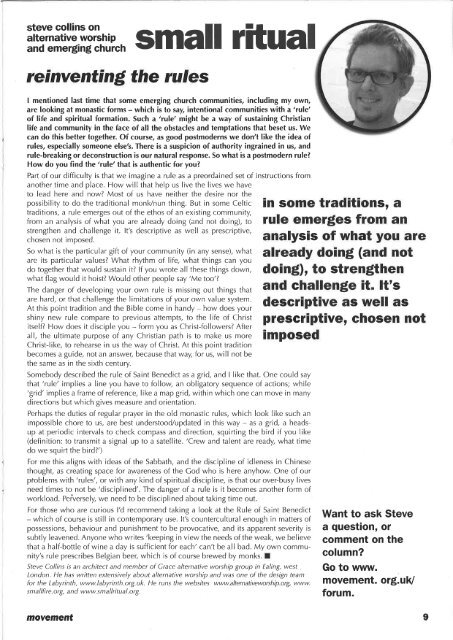Movement 123
Create successful ePaper yourself
Turn your PDF publications into a flip-book with our unique Google optimized e-Paper software.
steve collins on<br />
alternative worship<br />
and emerging church<br />
reinventin{, the rules<br />
small ritual<br />
I mentioned last time that some emerging church communities, including my own,<br />
are looking at monastic forms - which is to say, intentional communities with a 'rule'<br />
of life and spiritual formation. Such a 'rule' might be a way of sustaining Christian<br />
life and community in the face of all the obstacles and temptations that beset us. We<br />
can do this better together. Of course, as good postmoderns we don't like the idea of<br />
rules, especially someone else's. There is a suspicion of authority ingrained in us, and<br />
rule-breaking or deconstruction is our natural response. So what is a postmodern rule?<br />
How do you find the 'rule'that is authentic for you?<br />
Part of our difficulty is that we imagine a rule as a preordained set of instructions from<br />
another time and place. How will that help us live the lives we have<br />
to lead here and now? Most of us have neither the desire nor the<br />
possibility to do the traditional monk/nun thing. But in some Celtic<br />
traditions, a rule emerges out of the ethos of an existing community,<br />
from an analysis of what you are already doing (and not doing), to<br />
strengthen and challenge it. lt's descriptive as well as prescriptive,<br />
chosen not imposed.<br />
So what is the particular gift of your community (in any sense), what<br />
are its particular values? What rhythm of life, what things can you<br />
do together that would sustain it? lf you wrote all these things down,<br />
what flag would it hoist? Would other people say 'Me too'?<br />
The danger of developing your own rule is missing out things that<br />
are hard, or that challenge the limitations of your own value system.<br />
At this point tradition and the Bible come in handy - how does your<br />
shiny new rule compare to previous attempts, to the life of Christ<br />
itself? How does it disciple you - form you as Christ-followers? After<br />
all, the ultimate purpose of any Christian path is to make us more<br />
Christ-like, to rehearse in us the way of Christ. At this point tradition<br />
becomes a guide, not an answer, because that way, for us, will not be<br />
the same as in the sixth century.<br />
Somebody described the rule of Saint Benedict as a grid, and I like that. One could say<br />
that'rule' implies a line you have to follow, an obligatory sequence of actions; while<br />
'grid' implies a frame of reference, like a map grid, within which one can move in many<br />
directions but which gives measure and orientation.<br />
Perhaps the duties of regular prayer in the old monastic rules, which look like such an<br />
impossible chore to us, are best understood/updated in this way - as a grid, a headsup<br />
at periodic intervals to check compass and direction, squirting the bird if you like<br />
(definition: to transmit a signal up to a satellite. 'Crew and talent are ready, what time<br />
do we squirt the bird?')<br />
For me this aligns with ideas of the Sabbath, and the discipline of idleness in Chinese<br />
thought, as creating space for awareness of the Cod who is here anyhow. One of our<br />
problems with 'rules', or with any kind of spiritual discipline, is that our over-busy lives<br />
need times to not be'disciplined'. The danger of a rule is it becomes another form of<br />
workload. Peiversely, we need to be disciplined about taking time out.<br />
For those who are curious l'd recommend taking a look at the Rule of Saint Benedict<br />
- which of course is still in contemporary use. lt's countercultural enough in matters of<br />
possessions, behaviour and punishment to be provocative, and its apparent severity is<br />
subtly leavened. Anyone who writes'keeping in view the needs of the weak, we believe<br />
that a half-bottle of wine a day is sufficient for each' can't be all bad. My own community's<br />
rule prescribes Belgian beer, which is of course brewed by monks. I<br />
Steve Collins is an architect and member of Crace alternative worship group in Ealing, west ,<br />
London. He has written extensively about alternative worship and was one of the design team<br />
for the Labyrinth, www.labyrinth.org.uk. He runs the websites wvwv.alternativeworship.org, www.<br />
sm al lfi re.org, and www. s m al I ritu al.org.<br />
in some traditionsn a<br />
rule emerges from an<br />
analysis of what you are<br />
already doing (and not<br />
doing), to strentfihen<br />
and challenge it. lt's<br />
descriptive as well as<br />
prescriptive, chosen not<br />
imposed<br />
Want to ask Steve<br />
a question, or<br />
comment on the<br />
column?<br />
Go to www.<br />
movement. org.uk/<br />
forum.<br />
movement<br />
9

















